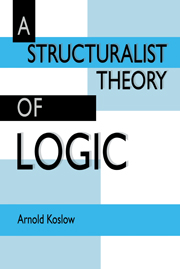Book contents
- Frontmatter
- Contents
- Preface
- Part I Background
- Part II Implication relations
- Part III The logical operators
- 11 Hypotheticals
- 12 Negations
- 13 Conjunctions
- 14 The disjunction operator
- 15 The logical operators parameterized
- 16 Further features of the operators
- 17 The dual of negation: Classical and nonclassical implication structures
- 18 The distinctness and relative power of the logical operators
- 19 Extensionality
- 20 Quantification
- 21 Identity
- 22 Special structures I: Logical operators on individuals: Mereology reconstituted
- 23 Special structures II: Interrogatives and implication relations
- 24 Completeness
- Part IV The modal operators
- Appendix A An implication relation for the integers in the programming language BASIC
- Appendix B Symmetric sequents as products of implication relations and their duals
- Appendix C Component-style logical operators and relevance
- Notes
- Bibliography
- Index
- Frontmatter
- Contents
- Preface
- Part I Background
- Part II Implication relations
- Part III The logical operators
- 11 Hypotheticals
- 12 Negations
- 13 Conjunctions
- 14 The disjunction operator
- 15 The logical operators parameterized
- 16 Further features of the operators
- 17 The dual of negation: Classical and nonclassical implication structures
- 18 The distinctness and relative power of the logical operators
- 19 Extensionality
- 20 Quantification
- 21 Identity
- 22 Special structures I: Logical operators on individuals: Mereology reconstituted
- 23 Special structures II: Interrogatives and implication relations
- 24 Completeness
- Part IV The modal operators
- Appendix A An implication relation for the integers in the programming language BASIC
- Appendix B Symmetric sequents as products of implication relations and their duals
- Appendix C Component-style logical operators and relevance
- Notes
- Bibliography
- Index
Summary
The logical operators have been defined over all implication structures. It is possible to develop a concept that is the generalization of the notion of a truth-value assignment that is also applicable in all structures, despite the fact that most of them do not have truth-bearers as members. It is a notion that reduces to the familiar truth-value assignments on those structures that are associated with the usual logical systems, and it yields a general framework within which one can study the extensionality (or nonextensionality) of the logical operators on arbitrary structures.
Extensionality and bisection implications
Suppose that S is a nonempty set, and T = 〈K, L〉 is a bisection on it. Form the bisection implication relation “⇒T” that is associated with T, and let IT = 〈S, ⇒T〉. Since “⇒T” is an implication relation, we can study the behavior of the logical operators with respect to it.
Consider the structure IT. Since CT(A, B) ⇒TA and CT(A, B) ⇒TB, and is the weakest to do so, it is possible to compute the distribution patterns for CT(A, B) in the sets K and L, given the distributions of A and B in K and L. Conjunctions. Suppose that A is in K. Then, since CT(A, B) ⇒TA, CT(A, B) cannot be in L.
- Type
- Chapter
- Information
- A Structuralist Theory of Logic , pp. 158 - 180Publisher: Cambridge University PressPrint publication year: 1992



